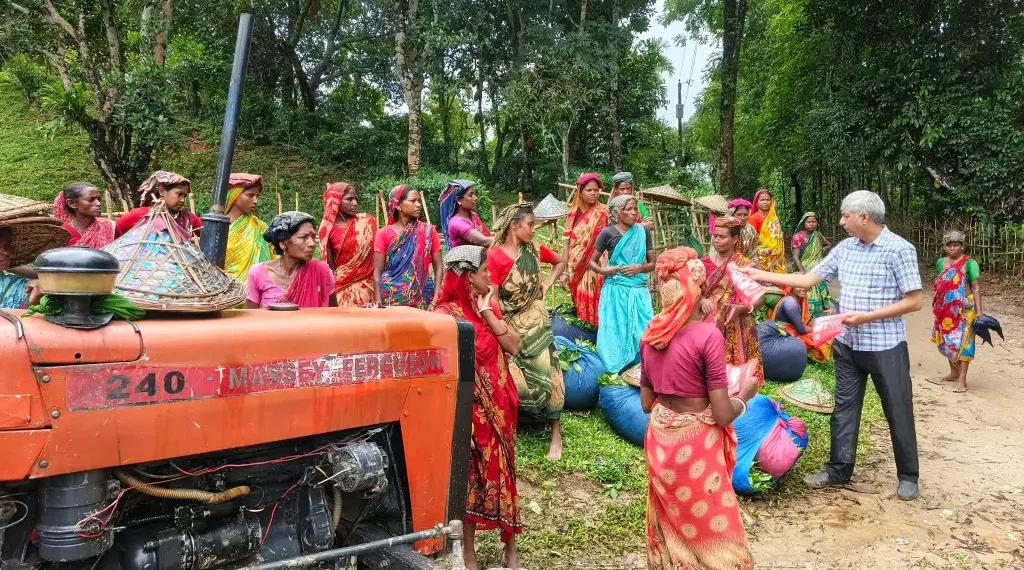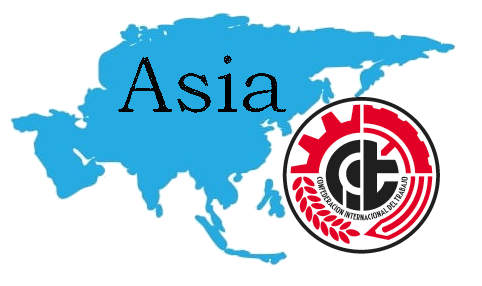The Tea Workers’ Trade Union Center (TWTUC) held its 1st National Conference on June 29th, with hundreds of workers coming together.
The conference was announced by comrades of TWTUC with the following statement:
Revolutionary greetings from the tea workers of Bangladesh. For generations, tea workers have endured systemic discrimination and exploitation. In response, we have been organizing sustained movements and struggles to secure our fundamental rights and dignity. Today, we express our heartfelt solidarity with tea workers across the world. From continent to continent, working people face similar patterns of exploitation, marginalization, and repression. Our struggle, therefore, is not confined within national borders—it is part of the broader fight for international working-class unity and justice.
We believe that the liberation of the working class cannot happen in isolation. True freedom is only possible through the unity and solidarity of all oppressed, exploited, and struggling workers across the globe. As part of our ongoing movement, we are pleased to announce the 1st National Conference and Mass Rally of the Tea Workers’ Trade Union Centre.
TWTUC released this 10-point charter of demands:
1) Wages
a) Set the minimum daily wage at 600 BDT*, preserving all current benefits (including rations, housing, and healthcare). Overtime must be compensated at double rate. For additional leaf picking, a payment of 12 BDT per kg must be ensured. Manipulation in weight measurements must stop—replace analogue scales with digital ones, visible to workers. An annual 10% wage increment must be guaranteed. The anti-worker Gazette published on 1 August 2023 must be repealed.
b) By labour law, provide all workers with Provident Fund, Gratuity, and 5% of company profits under Section 234 of the Bangladesh Labor Act, 2006. As per the 2016 agreement, retired workers must receive a pension equal to 1.5 months’ wages per year worked. In case of workplace death or disability, full lifetime earnings must be compensated
c) Provide two annual festival bonuses equivalent to a full month’s wage, and one additional incentive bonus—these must not be attendance-based.
d) Enforce casual leave (10 days/year) and earned leave (1 day for every 18 working days) as per labour law.
* 600 BDT equal approx. to 4.20 EUR / 4.93 USD. The current daily wage stands at 168 BDT and a new phase of labour struggles for higher wages could be expected later this year
2) Rations
Provide full family rations weekly, including rice, flour, lentils, oil, sugar/jiggery, soap, tea leaves, and kerosene. End all unjust ration deductions for agricultural land use. Sanitation infrastructure (toilets, etc.) must be provided per Section 59 of the Labor Act.
3) Land Rights
Grant legal ownership of residential and cultivated land to tea workers. Distribute unused land among unemployed tea worker youth.
4) Education
Officially recognize tea workers’ ethnic identity, language, and culture. Establish government primary schools in every tea garden. Provide primary education in workers’ native languages. Establish specialized secondary schools, colleges, technical institutes, and cultural academies in every valley.
5) Healthcare
Ensure qualified MBBS doctors, functional community clinics, and adequate medicine supplies in every garden. Provide safety equipment against pesticide-related health hazards. Install deep tube wells and one tube well per 20 families for safe drinking water. Each garden must have at least one ambulance.
6) Women’s Rights
Grant 6 months paid maternity leave to female tea workers. Provide 2 days of paid menstrual leave per month. Supply free sanitary pads through community clinics. Ensure safe and hygienic delivery facilities, nutrition, medicine, and vaccines. Allocate raincoats to all female workers each monsoon. Build separate toilets for women in each section. Take effective measures to eliminate child marriage and violence against women in tea gardens.
7) Job Security & Employment
Regularize the employment of all temporary workers. Provide job opportunities for unemployed tea workers. Eliminate child labour in gardens. Establish quota reservations in employment for workers’ children. Employ educated female workers in staff positions.
8) Recognition of Historical Struggles
Declare May 20—the day of the historic “Cholo Mulluke” tea worker uprising—as National Tea Workers Day, with paid leave. Identify and honour tea worker freedom fighters and martyrs from the Liberation War. Preserve all related memorial sites.
9) Local Governance
Form union councils (Union Parishads) based on tea gardens. Utilize all opportunities to form sub-districts (upazilas) in tea-producing regions.
10) Legal & Organizational Rights
Repeal all anti-worker laws in the tea industry. Ensure the right to free association and trade union formation. Fully implement the Labor Act in tea gardens. Establish a Minimum Wage Board specific to the tea industry. Set up a permanent Labor Court in Sreemangal and ensure resolution of all cases within 90 days.
Several unions and comrades in Bangladesh and internationally expressed their support and solidarity with the tea workers ahead of the TWTUC conference, such as GABRIELA, the broadest alliance of Filipino women, and the International Confederation of Labour (ICL-CIT). All greetings were published on the TWTUC facebook page.
Also available in:
 Español (Spanish)
Español (Spanish)













